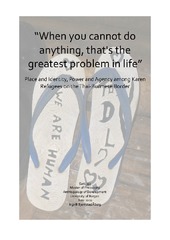"When you cannot do anything, that's the greatest problem in life" - Place and identity, power and agency among Karen refugees on the Thai-Burmese border
Master thesis
Permanent lenke
https://hdl.handle.net/1956/4050Utgivelsesdato
2010-06-17Metadata
Vis full innførselSamlinger
Sammendrag
In this thesis, identity formation processes among refugees from the ethnic group of Karen from Burma, in camps along the Thai-Burmese border are explored. Questions related to subjectivity formation are discussed, such as the possible effects of a state of refugee ; changing gender relations, how people think about themselves in the world and their possibilities for the future. Discussing conceptualizations of refugeeness" and linkages between place and identity, I argue that the relation to and representations of the homeland, Karen State, were characterized by ambiguity and paradox. Karen State was simultaneously imagined as a Perfect Place, and remembered in terms of suffering and terror. These paradoxical representations served the purpose of sustaining a powerful nationalistic discourse, produced and reproduced by the military organization Karen National Union (KNU). The refugee camps, I argue, served as arenas for consolidation of notions of ethnicity and sentiments of nationalism. Simultaneously however, a thriving organizational environment in the refugee community provided a certain potential for the camps to function as multi-discourse sites.Gender relations were changing in the transition from Karen State to the camp. I point to the Karen Women's Organization (KWO) as an influential actor, the strong ideological position of which has produced a broader range of possible modes of action for women, for instance regarding female leadership. The KWO did not, however, fundamentally challenge the ideological hegemony of the KWO. There were also other circumstances affecting gender relations in the camp community. A change in the division of labor and better access to education were amongst them. Alcoholism and domestic violence nevertheless remained as gender-related problems in the camps.The social transformation resulting from moving from Karen State to the camps, including possibilities for applying for resettlement through the UNHCR, affected subjectivity formation, and how young Karens thought and talked about the future. In a situation of marginalization and insecurity, many resorted to an act of mixing dreams and wishes with thoughts and plans that relate to their real and actual options. This led to apparently contradictory representations of oneself and one's plans and possibilities.Overall I have argued that Karen refugees in the border area were in a state of ambiguity, resulting in paradoxes of representation. I see this as a way of making meaning out of what was in the end an utterly marginalized position. Apparent inconsistencies in conceptualizations of myth and history, imaginaries and reality, dreams and plans, should be seen in light of this.
Utgiver
The University of BergenOpphavsrett
The authorCopyright the author. All rights reserved
